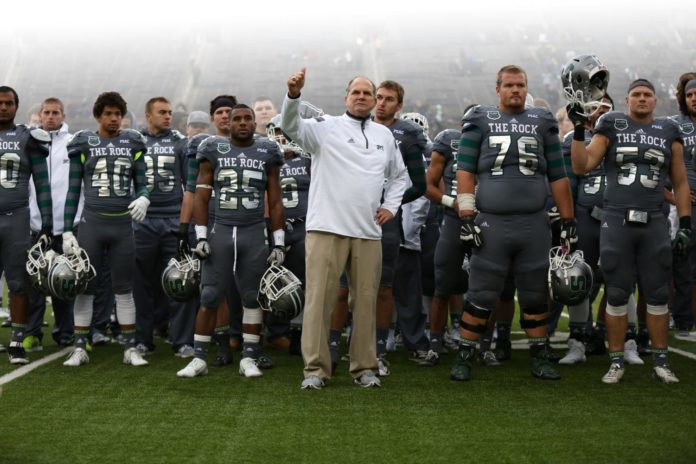Measuring the success of a college football head coach is not an exact science. There are a lot of factors that go into every win or loss, so it is hard to know just how much credit or blame to place on the head coach. However, whatever metric you use, long-time Slippery Rock head coach George Mihalik will likely be near the top of the list.
In 28 years as head coach at SRU, Mihalik totaled a 197-111-4 (.638) record with eight Pennsylvania State Athletic Conference (PSAC) West Division championships, six PSAC West Coach of the Year awards and six NCAA national playoffs berths. Mihalik was also inducted into the SRU athletic hall of fame in 1997 and SRU’s stadium was renamed to Mihalik-Thompson in his honor in 2011.
By any measure, Mihalik is a legendary college football coach. What is perhaps most telling of his success is the number of other football coaches he inspired. By his own estimation, Mihalik has had 38 assistant coaches in his time at Slippery Rock eventually went on to coach elsewhere. In football circles, this is called the Mihalik coaching tree.
Mihalik said that the greatest pride he feels is when someone he coached with loved it so much that they continued to do it even after they left SRU.
“I think the biggest compliment you can have is somebody who coaches with you, who wants to continue to coach, because that means they had a great experience,” Mihalik said. “You know people who have jobs and they say, ‘I never want that job again’ because it was a negative experience. So anyone of these guys that you could mention I’m so proud of them, because at some point during my association with them they got a love for coaching and that love was fostered during our time together.”
The roots of Mihalik’s coaching tree run deep, and the branches have spread out wide. There are former Mihalik assistants in all four NCAA football divisions across the entire nation. Jay Foster is one of the longest tenured assistant coaches that Mihalik ever had. Foster was SRU’s defensive coordinator from 1988 (Mihalik’s first year) until 2006. In 2006 he accepted a job as head coach of PSAC-West rival Clarion University. Slippery Rock and Clarion have one of the best rivalries in the PSAC and play each other once a year. Mihalik said it was hard to coach against someone he knew so well.
“That was always a tough game, because we were great friends and you just knew at the end of the day someone’s happy and someone is not happy,” Mihalik said. “It was always tough to coach against someone who you had a strong personal relationship with. You wanted the best for him every week, but the time you played him, someone wasn’t happy.”
Foster echoed Mihalik’s sentiment, saying that it was more like playing a family member rather than a rival school.
“It’s like playing your family, playing against your older brother,” Foster said. “You want to beat him so bad. If you win obviously you’re happy but at the same time you’re bummed because you beat your brother. If you lose you’re bummed, but if you’re going to lose to somebody you wouldn’t want to lose to anyone else.”
Foster put together a 29-70 record in nine years as head coach at Clarion before moving on to be the wide receivers coach at the University of Albany.
After two years at Albany, Foster retired from coaching college football and now coaches high school football in Washington. Foster said that one of the best things that Mihalik did was not interfere too much with what his assistants were doing.
“I think the biggest thing that I’ll always remember Coach for was, he allowed his coaches to coach,” Foster said. “He was not a micromanager and I always appreciated that. He let us do our job, he trusted us to do our job. That was one of the things I’ll always remember and I’ll always appreciate about him, I was pretty young when I became a coordinator for him, and he trusted me.”
Beyond Foster, Mihalik’s influence can be seen all over the PSAC. Shawn Lutz and Dom Razzano are coaches at SRU, Tom Herman is the offensive line coach at Mercyhurst, Bill Perkins is the strength and conditioning coach at Bloomsburg and Larry Wilson coaches wide receivers at California (Pa.).
Lutz worked on Mihalik’s staff for 20 years and eventually succeeded Mihalik as SRU’s head coach in 2016 following Mihalik’s retirement. Lutz started at The Rock in 1996 as the tight ends coach. He spent time as the defensive line coach, defensive coordinator and associate head coach prior to becoming head coach.
Lutz said that he never expected to spend more than a year or two at Slippery Rock, but stayed because of the culture that Mihalik had created.
“I never realized how long I would be here at Slippery Rock,” Lutz said. “I thought this is a place where I’d be here a year or two and then springboard to somewhere in division I. What I figured out was, it’s a special place because of what coach Mihalik is all about, about family and it’s not all about football.”
Mihalik said that he never hired an assistant based on their football knowledge, rather he hired people on what kind of person they were.
“If you have good people, you’ll have a good program,” Mihalik said. “I was looking at the person. The X’s and O’s, if you don’t have it we can teach you that. But if you’re not a good person I can’t change you, I can’t make you a good person.”
In Lutz, Mihalik said that he saw a young man with enthusiasm and a passion for football and coaching and a willingness to work hard and he said he knew Lutz would make a good coach.
Another Mihalik product who went on to be a head coach is Rob Keys. Keys coached with Mihalik from 2006-2009 as the defensive backs coach and has been the head coach at Division II University of Findlay since 2011. Keys is joined at Findlay by Jason Makrinos, who coached at SRU in two stints in 2005-2006 and 2010-2013.
Mihalik’s coaching tree reaches all the way into Division I football, with a number of coaches working at college football’s highest level.
The fastest rise from Mihalik’s staff to Division I was former SRU offensive coordinator Phil Longo. Longo joined The Rock in 2011 as the wide receivers coach, joining his wife Tanya Longo who was head coach of the SRU women’s basketball team at the time. Longo then spent 2012 and 2013 as SRU’s offensive coordinator, before joining division I Sam Houston State in 2014.
After two years there, Longo is now the offensive coordinator at SEC school Ole Miss University.
Longo’s successor at SRU, Zack Patterson, has also made a quick rise into the division I coaching ranks. Patterson started at The Rock in 2012 and replaced Longo as the offensive coordinator in 2015.
In Patterson’s only season at the helm of SRU’s offense led division in scoring with 45.2 points per game and was fifth in total offense with 490.3 yards per game. After his impressive season Patterson was hired by Sam Houston State in 2016 where he currently coaches the running backs.
Patterson is the latest in a long line of young coaches who got their start under Mihalik and then went on to coach else where. Quindell Dean (now at Fairmont State), Joe Lamenza (Blackhawk high school), Casey Vogt (Mercer University), Ricky Porter (Jackson State), JJ Milanovich (Emporia State), Brian Radakovich (Waynesburg) and John Bell (St. Vincent) all started their coaching careers at SRU before moving on to other schools.
“I always took great pride in getting that young coach and giving him his first start,” Mihalik said. “Giving him his chance as a [graduate] assistant which then leads to fulltime coaching, either here or elsewhere. I always viewed myself as a mentor.”
Mihalik also liked bringing in former players to his staff. The most successful former players who worked with Mihalik are Eric Thatcher, who played at the University of Pittsburgh from 2004-2008, and Keith Willis, who played in the NFL from 1982-1993.
Thatcher had coached at a few different places after his playing days before coming to SRU in 2013, but he said that the family atmosphere Mihalik had created here was what made Slippery Rock a special place to coach.
“I learned how to manage coaching and family time,” Thatcher said. “I learned to get rid of football sometimes and just go be with your wife, your kids.”
Thatcher said that there were times with assistant coaches when Mihalik would not want to talk about football. He said Mihalik would just talk about life and how he could help his assistant coaches in their lives. Thatcher said Mihalik helped them all become better men, fathers, husbands and boyfriends just in those times when he would put football to the side and talk to them.
After playing in the NFL, Willis tried working in radio, but ultimately decided he wanted to try his hand at coaching. To start, Willis was just looking to volunteer at any school that would take him. He started his search at Youngstown State, but when he traveled to campus and talked to their coach he realized they did not have a spot for him. On his way back home he decided to stop at Slippery Rock, just to see.
Willis said that from the beginning Mihalik treated him differently. Within 48 hours of his interview, Mihalik had called Willis and offered him a position, but instead of volunteer like he had wanted, Mihalik insisted that Willis be paid. Willis started at SRU in 1995 and after one year he said that he had the opportunity to go elsewhere, but did not want to leave Mihalik.
“Being around these guys was unbelievable,” Willis said. “I had an opportunity to go after one year, but I ended up staying for four. I would have paid to coach for (Mihalik).”
Willis stayed at SRU until 1998 and worked his way up through the division I and professional ranks and now serves as a defensive line assistant for the Tennessee Titans in the NFL.
“I learned don’t be afraid to say that you’re wrong,” Willis said. “Don’t be afraid to apologize to your players, that’s how you gain more respect.”
Throughout all the years he was at Slippery Rock, all the players he coached and all the assistants he worked with, Mihalik emphasized family and fun above everything else, even football. In doing this he created a culture that people wanted to be a part of. Players wanted to play for him, assistants want to work for him and all the while Mihalik was facilitating a love for football that often lasted beyond their time at Slippery Rock.







